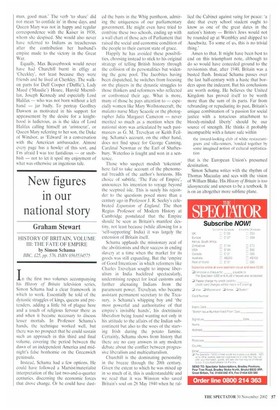New figures in our national story
Graham Stewart
HISTORY OF BRITAIN, VOLUME III: THE FATE OF EMPIRE by Simon Schama BBC, £25, pp. 576, ISBN 0563534575 In the first two volumes accompanying his History of Britain television series, Simon Schama had a clear framework in which to work. Essentially he told of the dynastic struggles of kings, queens and pretenders, adding a little bit of plague here and a touch of religious fervour there as and when it became necessary to discuss lesser mortals. In Professor Schama's hands, the technique worked well, but there was no prospect that he could sustain such an approach in this third and final volume, covering the period between the dawn of an independent America and midnight's false bonhomie on the Greenwich peninsula.
Instead, Schama had a few options. He could have followed a Marxist/materialist interpretation of the last two-and-a-quarter centuries, discerning the economic forces that drove change. Or he could have dust
ed the busts in the Whig pantheon, admiring the uniqueness of our parliamentary government. He might even have tried to combine these two schools, ending up with a wall chart of those acts of Parliament that raised the social and economic condition of the people to their current state of grace.
Happily he has avoided these possibilities, choosing instead to stick to his original strategy of telling British history through the collision of its personalities but widening the gene pool. The Jacobites having been dispatched, he switches from focusing on the players in the dynastic struggles to those thinkers and reformers who reflected or confronted their age. What is more, many of those he pays attention to — especially women like Mary Wollstonecraft, the mulatto nurse Mary Seacole or the photographer Julia Margaret Cameron — never merited so much as a mention when the national story was articulated by such pastmasters as G. M. Trevelyan or Keith Feiling. Schama's account, on the other hand, does not find space for George Canning, Cardinal Newman or the Earl of Shaftesbury. Waterloo is fought and won in a sentence.
Those who suspect modish 'tokenism' here fail to take account of the phenomenal breadth of the author's horizons. His choice of subtitle, 'The Fate of Empire', announces his intention to voyage beyond the sceptred isle. This is surely his rejoinder to the questions posed more than a century ago in Professor J. R. Seeley's celebrated Expansion of England. The then Regius Professor of Modern History at Cambridge postulated that the Empire should be seen as Britain's manifest destiny, not least because (while allowing for a 'self-supporting' India) it was largely the extension of Britain itself.
Schama applauds the missionary zeal of the abolitionists and their success in ending slavery at a time when the market for its goods was still expanding. But the 'empire of Good Intentions' in which reformers like Charles Trevelyan sought to impose liberalism in India backfired spectacularly, undermining respect for local customs and further alienating Indians from the paramount power. Trevelyan, who became assistant permanent secretary to the Treasury, is Schama's whipping boy and 'the most powerful and authoritative of that empire's invisible hands', his doctrinaire liberalism being found wanting not only in his attitude to the affairs of the Indian subcontinent but also to the woes of the starving Irish during the potato famine. Certainly, Schama shows from history that there are no easy answers in any modern debate about the conflict between progressive liberalism and multiculturalism.
Churchill is the dominating personality in the breeze through the 20th century. Given the extent to which he was mixed up in so much of it, this is understandable and we read that it was Winston who saved Britain's soul on 28 May 1940 when he ral
lied the Cabinet against suing for peace: 'a date that every school student ought to know as one of the great dates in the nation's history — Britisn Jews would not be rounded up at Wembley and shipped to Auschwitz. To some of us, this is no trivial thing.'
Amen to that. It might have been best to end on this triumphant note, although to do so would have conceded ground to the revisionists that, after 1940, Britain was a busted flush. Instead Schama passes over the last half-century with a haste that borders upon the indecent, But his conclusions are worth noting. He believes the United Kingdom has proved itself to be worth more than the sum of its parts. Far from rebranding or repudiating its past, Britain's unique combination of 'a passion for social justice with a tenacious attachment to bloody-minded liberty' should be our source of strength. He thinks it probably incompatible with a future safe within
the inward-looking club c.)f white restaurantgoers and villa-renters, bonded together by some imagined notion of cultural sophistication
that is the European Union's presumed destination, Simon Schama writes with the rhythm of Thomas Macaulay and sees with the vision of William Blake. His History of Britain is too idiosyncratic and uneven to be a textbook. It is on an altogether more sublime plane.


























































































 Previous page
Previous page